"God Help us All"
Unknown Frenchman
Chapter 12: January 1st, 1946-December 31st, 1949
Cold War
We're Doing the Split, Split Split, We're Doing the Split.

As 1946 came, the rift between the Allied Powers continued to widen as ideological diffrences seperated Washington from Berlin and Moscow, the two sides while still technically allied, began working against each other's interests, as both sides sought to push there various agenda across the war shattered continet of Europe, Russia, still recovering from the death of President Trotsky in the late stages of World War II. President Faddey Trepov sought to push forward the Zhukov Plan, which sought to bring economic assistence and relieve to the war torn countries of the continet. the Americans througholously opposed this, and sought to push there agenda, and create a sphere of Communist buffer states in Europe, the Americans would push there agenda in many ways over the next several years. many ways indeed.
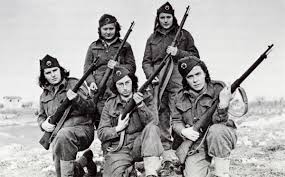
A Regiment of the Swiss People's Army, the succsessor to the famous Partisans, circa 1946
The Late 1940's would be a time of great change within Europe, the defeated Axis Powers had been occupied, and the war crimes of the French had been exposed, the Holocaust made light, the Fascist leaders were quickly being removed, however a new tide was rolling in, in Switzerland, the war torn Alps country had largely liberated itself during World War II, The Communist Swiss Partisans led by Marshall Heinz Fritzschker, minorly helped by Allied Bombers late in the war, had slowly recaptured Switzerland from the Axis Powers, the post-war say the Partisans and the Government-in-Exile forming a Coalition Government based in Bern, however both sides were distrustful of one another, the Communists highly, as the Resistence Force that supported the Government-in-Exile led by Minister President Oskar Leimburger, the Genevists, collaberated with the Nasi's during the war, mostly in there mini Civil War with the Swiss Partisans. the Communists worked behind the scenes to remove the Republicans, they would discover that several Minister's in Leimburger cabinet had been friends with several high ranking Nasi officals, and openly supported the Genevists, the Communists used this as cascus belli to Oust Leimburger's side of the government from power, gaining popular support in Switzerland, on July 1st, 1946, Leimburger was stripped of his power by the Swiss Parliament, the former Government-in-Exile ousted, that day the "Swiss Socialist Republic" headed by Marshal Fritzskher was declared, this state was initally supportive of Washington, however relations would grow tense later on.
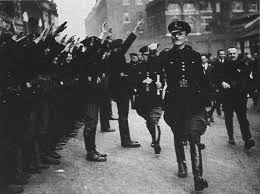
Chief Oswald Mosley of the Commonwealth of Great Britian, during a Military Parade in London, circa 1943.
Action in the rest of Europe would continue to turn things into Washington's favor, Washington had promised Berlin and Moscow free and fair elections within several states it occupied, (Spain, Portugal, Albania, etc) however Orman Brussells had never intended to follow through on this promise, over the course of 1946 and 1947, elections held within Portugal, Spain, Albania, Greece would see Communist parties elected to office, turning these states into American satalite states, this was felt most in Iberia, as Portugal, a collabrator with France, was dismembered, and absorbed into Spain, which was receded Catalonia by the allies, the American dissolved Portugal as a state as a punishment for helping France, this would bring about the People's Republic of Iberia, a Spanish dominated state. The Fascist Government in Britain would however begin to prop up a exiled Portuguese Regime in Portugal's colonies, Angola and Mozambique, and after World War II, many were not willing to fight Britain on that, the occupation of Bulgaria also came under threat, as Communist Elements of the Bulgarian Underground began to gain traction within Bulgaria, action also commenced in Serbia and Croatia, who after negotiations throughout 1946, and with American support, decided to unite the two fragile states into a united South Slav State, the Federal Socialist Republic of Yugoslavia, as South Slav Nationalism was rampantly high at this point, on June 17th, 1947, America, and it's puppets throughout the America's and Europe, signed the Havana Mututal Agreement Pact of Friendship and Alliance, officaly forming what would become known as the "Havana Pact" the alliance of Communist States throughout the World.
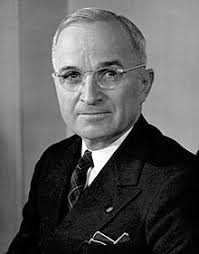
Faddey Tropov, President of Russia after Trotsky's death.
In the Democratic Camp, 1946 and 47 would prove to be interesting for them also, the First German Elections since 1937 saw Chancellor Adolf Hitler and the Zentrum voted out of power, with Kurt Schumacher and the Social Democrats reassuming power, on a Anti-War Platform, that the future needed to come, and the war leaders needed to go, however the "The German Shepherd" As Hitler had been nicknamed as continued to be immensly popular within Germany, in Russia, the death of Leon Trotsky in the closing months of 1945 led a Central Russian by the name of Faddey Trepov as President, Trotsky had been know to be in ill health, and it was known whoever was his Vice Presidential nominee in 1944 would be the next President, Trepov had been more cautious of Communism then Trotsky, seeing the possible need for Democratic unity againist the rising threat of Communism, the events of 1946 and 47 would convince Trepov of this further, who however was also cautious of Japan in the East, who proved a threat to both the Communists and Democratics, nonetheless, the formation of the Havana Pact forced Trepov to talk with other Democratic leaders about the formation of a similar pact, this led after months of talk with Russian allies, to the formation of the Eastern European and Asian Trade Union (or EATU) as a bulwark against the Havana Pact, Russia would prove to be the leader of this pact, as states began to join EATU.
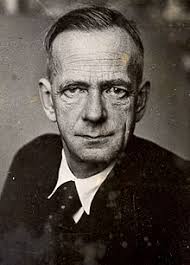
Kurt Schumacher, leader of the Social Democratic Party
In regards to territorial changes, as expected by many, the Lorraine Special Administrative Zone was formally annexed by the German Empire on June 1st, 1947. added to Alsace-Lorraine, and as promised, the referundum in Austria took place in June of 1949, with 57% voting to join Germany, which resulted in Austria becoming a offical part of Germany, through some suspect the referundum was falsified, as Berlin wanted to punish the Austrians harshly, but believed them to be fellow Germans, and probaly did falisy the Referundum to some extent, through historical experts note the Austrian idenity became lost after World War II, the exile of the Habsburgs to Finland, many Austrians felt lost with there idenity, through it is unknown if the referundum was falisfied or not. the Czech and Slovak administrative zone also received independence as promised on January 1st, 1946, as the Kingdom of Czechoslovakia, a constitutional monarchy, Emperor Wilhelm III installed his son Prince Albert, a fluent speaker of Czech and Slovak, as King Stepan I, (Stepan I, King of the Czechs and Slovaks, Margarite of Moravia, Grand Duke of Prauge, Prince of Carpathia) beleiveing if a Hohernzollern held the throne, they might be able to keep Czechoslovakia from falling into Communist hands, Stepan held no politcial power whatsoever, however many Czechs and Slovaks were slightly irked about being handed another German monarch, however as he held no power, many just decided to go along with it, as they finally got there independence as there own state, as the threat of Communism became real, Hungary also was given independence from occupation, through much smaller, and as a Republic, the Netherlands and Belgium also received independence, with both the Dutch and Belgian royal family's were restored to there respective thrones, along with Denmark being given back Greenland and Iceland, however, things would really begin to shake up in Africa.

An Israeli woman receiving basic military training during the Israeli War of Independence, circa 1948
Uganda had been a German colony since the end of World War I, ceded by Britain, mass Jewish migration to the German colony, and soon the diffrence between the African and Jewish populations began to cause a rift, the Holocaust and World War II caused even more Jewish migration to Uganda, and soon the Jewish population began to outweigh the African population, the German mandate over Uganda was set to expire June 31st, 1948, and was set to be partitioned into a Jewish and African state, however the night before the expiration of the Mandate, David Ben-Gurion declared independence of "Israel" from Germany, Orman Rovelle Brussells and Faddey Trepov both regonized this state, however Ethiopia did not, and intervened on behalf of the Ugandans, the Israeli War of Independence (June 31st, 1948-January 17th, 1949) saw the Ethiopians intervene on behalf, the war would turn to be a bloody war of conflict in the jungles and plains, as the Ethiopians attempted to squash the Young Jewish State, however the Israelis proved to be a comable fighting force, supplemented by many Jewish soldiers who fought for the Germans in the African Front of the Second World War, the Israelis proved to be a surprise for the Ethiopians, the bloody 5 month war would end in a crushing Ethiopian defeat, and in a Israeli victory, the Council of Nations sponsered Armistice was signed on January 9th, 1949, and the Peace on January 17th, cession of several border territories containing majority Jewish population would occur, along with the Ethiopian regonition of Israeli independence, and the defeat of a African state in Uganda, the young Jewish state had proved itself capable of surviving, and was put forward on the world stage.
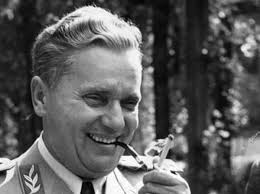
Marshal Heinz Fritzskher, leader of the Swiss Socialist Republic, Circa 1947
1948 and 1949 would also prove to be interesting years for the Communists and Capitalists, within the Communist camp. tensions between Switzerland and the UASR would rise in 47 and 48, unlike the rest of the members of the Havana Pact, Switzerland was not reliant on the UASR, as the Swiss Partisans had largely liberated Switzerland itself without outside help during World War II, including the last battle featuring French forces in the war, the Reclaimation of Bern 7 days after the French surrender, and thus, Marshal Fritzskher and the Swiss Socialist Republic had a independent mindset, diffrent to that of the unified mindset of Washington, this angered Washington, who wanted to turn Switzerland into another Satalite state of Washington, tensions between Fritzskher and Brussells over managament of his state, his interactions with the East, who Switzerland was still somewhat friendly with, and didn't have as much of a grudge with as the rest of the Havana Pact, back and forth bickering between Washington and Bern throughout 47 and 48 resulted in Switzerland's expulsion from the Comitern and the Havana Pact, known as the Fritzskher-Brussells split, the Swiss Socialist Republic soon became the leader of the non-aligned movement, slightly returning to Switzerland's long standing policy of neutrality, as Switzerland had no desire to be Washington's puppet.
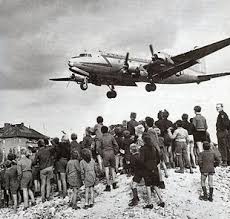
A Photo from the Parisian Airlift, showing a Russian Mig 49 delivering supplies to a starving Parisan populace, circa 1949
Tensions that would result in the breakdown of the Allied Occupation of France would soon cultimate as well. Brussells had long held his own agenda, and plotted to take all of France for the Havana Pact, push the Germans and Russians out, the Allied Control Council met for the last time in June of 1948, as the Americans begin pushing plans to bring the Eastern Allies into what they want by "regulating" accsess to Paris, this began with all cargo of food shipments of Eastern Allied Trains coming into Paris being required to be inspected by American officals, violations of North Parisian airspace, and restrictions on travel, after the adoption of the French Franc in the Russian, German, and Swiss zones, which had became a Trizone, economically, the Americans issued the Parisian Blockade, halting all passenger trains and traffic on the Autovie to Paris, delayed all Eastern and French shipments and required water transport to take a 23 day long trip around Britain because of "damage to a bridge", a American represenitive informed the other Allied Powers that the city of Paris would only be circulated with American occupation zone money, the South French Franc, they also stopped supplying food to the German, Russian and Swiss sectors of Paris, leaving only the Air Corridors open, the Americans argued the Eastern Allies had no right to free transit into Paris, the quickly starving North Parisian populace caused the Eastern Allies to have to work (including the Swiss, as the Fritzskher-Brussells split had just happend), this lead the the Eastern Allies beginging the Parisian Airlift, a massive operation to bring food to the hungry people's of Paris, the Airlift was risky gamble, for both, trying to keep the planes from reaching Paris might risk war if the Americans tried to do anything, they thought, well the Airlift might provoke war with the Communists, a Third World War, however the Airlift would prove to be succsessful in the end, after several months, the Americans backed down. the blockade ended, and normal traffic into Paris resumed, however the events of 1947, 1948, and 1949 had moved to the process of two seperate French states, as the origional plan of a united democratic French state proved to be impossible with the in bickering of the Allies, the Americans refused to return to the AMC (Allied Military Council) and thus, in May of 1949, the Eastern Allied (German, Russian and Swiss) occupation zones united to form the Federal Republic of France (North France), the Americans followed suit in October, forming the French Democratic Republic (South France), the breakdown of the Allied Military Council in France would end up leading to a breakdown in Italy, and tension rising on the Italian Penisula,
The events of the late 40's would prove to be a turning point in world history and thus after them, the Cold War had begun.
Unknown Frenchman
Chapter 12: January 1st, 1946-December 31st, 1949
Cold War
We're Doing the Split, Split Split, We're Doing the Split.

As 1946 came, the rift between the Allied Powers continued to widen as ideological diffrences seperated Washington from Berlin and Moscow, the two sides while still technically allied, began working against each other's interests, as both sides sought to push there various agenda across the war shattered continet of Europe, Russia, still recovering from the death of President Trotsky in the late stages of World War II. President Faddey Trepov sought to push forward the Zhukov Plan, which sought to bring economic assistence and relieve to the war torn countries of the continet. the Americans througholously opposed this, and sought to push there agenda, and create a sphere of Communist buffer states in Europe, the Americans would push there agenda in many ways over the next several years. many ways indeed.
A Regiment of the Swiss People's Army, the succsessor to the famous Partisans, circa 1946
The Late 1940's would be a time of great change within Europe, the defeated Axis Powers had been occupied, and the war crimes of the French had been exposed, the Holocaust made light, the Fascist leaders were quickly being removed, however a new tide was rolling in, in Switzerland, the war torn Alps country had largely liberated itself during World War II, The Communist Swiss Partisans led by Marshall Heinz Fritzschker, minorly helped by Allied Bombers late in the war, had slowly recaptured Switzerland from the Axis Powers, the post-war say the Partisans and the Government-in-Exile forming a Coalition Government based in Bern, however both sides were distrustful of one another, the Communists highly, as the Resistence Force that supported the Government-in-Exile led by Minister President Oskar Leimburger, the Genevists, collaberated with the Nasi's during the war, mostly in there mini Civil War with the Swiss Partisans. the Communists worked behind the scenes to remove the Republicans, they would discover that several Minister's in Leimburger cabinet had been friends with several high ranking Nasi officals, and openly supported the Genevists, the Communists used this as cascus belli to Oust Leimburger's side of the government from power, gaining popular support in Switzerland, on July 1st, 1946, Leimburger was stripped of his power by the Swiss Parliament, the former Government-in-Exile ousted, that day the "Swiss Socialist Republic" headed by Marshal Fritzskher was declared, this state was initally supportive of Washington, however relations would grow tense later on.
Chief Oswald Mosley of the Commonwealth of Great Britian, during a Military Parade in London, circa 1943.
Action in the rest of Europe would continue to turn things into Washington's favor, Washington had promised Berlin and Moscow free and fair elections within several states it occupied, (Spain, Portugal, Albania, etc) however Orman Brussells had never intended to follow through on this promise, over the course of 1946 and 1947, elections held within Portugal, Spain, Albania, Greece would see Communist parties elected to office, turning these states into American satalite states, this was felt most in Iberia, as Portugal, a collabrator with France, was dismembered, and absorbed into Spain, which was receded Catalonia by the allies, the American dissolved Portugal as a state as a punishment for helping France, this would bring about the People's Republic of Iberia, a Spanish dominated state. The Fascist Government in Britain would however begin to prop up a exiled Portuguese Regime in Portugal's colonies, Angola and Mozambique, and after World War II, many were not willing to fight Britain on that, the occupation of Bulgaria also came under threat, as Communist Elements of the Bulgarian Underground began to gain traction within Bulgaria, action also commenced in Serbia and Croatia, who after negotiations throughout 1946, and with American support, decided to unite the two fragile states into a united South Slav State, the Federal Socialist Republic of Yugoslavia, as South Slav Nationalism was rampantly high at this point, on June 17th, 1947, America, and it's puppets throughout the America's and Europe, signed the Havana Mututal Agreement Pact of Friendship and Alliance, officaly forming what would become known as the "Havana Pact" the alliance of Communist States throughout the World.
Faddey Tropov, President of Russia after Trotsky's death.
In the Democratic Camp, 1946 and 47 would prove to be interesting for them also, the First German Elections since 1937 saw Chancellor Adolf Hitler and the Zentrum voted out of power, with Kurt Schumacher and the Social Democrats reassuming power, on a Anti-War Platform, that the future needed to come, and the war leaders needed to go, however the "The German Shepherd" As Hitler had been nicknamed as continued to be immensly popular within Germany, in Russia, the death of Leon Trotsky in the closing months of 1945 led a Central Russian by the name of Faddey Trepov as President, Trotsky had been know to be in ill health, and it was known whoever was his Vice Presidential nominee in 1944 would be the next President, Trepov had been more cautious of Communism then Trotsky, seeing the possible need for Democratic unity againist the rising threat of Communism, the events of 1946 and 47 would convince Trepov of this further, who however was also cautious of Japan in the East, who proved a threat to both the Communists and Democratics, nonetheless, the formation of the Havana Pact forced Trepov to talk with other Democratic leaders about the formation of a similar pact, this led after months of talk with Russian allies, to the formation of the Eastern European and Asian Trade Union (or EATU) as a bulwark against the Havana Pact, Russia would prove to be the leader of this pact, as states began to join EATU.
Kurt Schumacher, leader of the Social Democratic Party
In regards to territorial changes, as expected by many, the Lorraine Special Administrative Zone was formally annexed by the German Empire on June 1st, 1947. added to Alsace-Lorraine, and as promised, the referundum in Austria took place in June of 1949, with 57% voting to join Germany, which resulted in Austria becoming a offical part of Germany, through some suspect the referundum was falsified, as Berlin wanted to punish the Austrians harshly, but believed them to be fellow Germans, and probaly did falisy the Referundum to some extent, through historical experts note the Austrian idenity became lost after World War II, the exile of the Habsburgs to Finland, many Austrians felt lost with there idenity, through it is unknown if the referundum was falisfied or not. the Czech and Slovak administrative zone also received independence as promised on January 1st, 1946, as the Kingdom of Czechoslovakia, a constitutional monarchy, Emperor Wilhelm III installed his son Prince Albert, a fluent speaker of Czech and Slovak, as King Stepan I, (Stepan I, King of the Czechs and Slovaks, Margarite of Moravia, Grand Duke of Prauge, Prince of Carpathia) beleiveing if a Hohernzollern held the throne, they might be able to keep Czechoslovakia from falling into Communist hands, Stepan held no politcial power whatsoever, however many Czechs and Slovaks were slightly irked about being handed another German monarch, however as he held no power, many just decided to go along with it, as they finally got there independence as there own state, as the threat of Communism became real, Hungary also was given independence from occupation, through much smaller, and as a Republic, the Netherlands and Belgium also received independence, with both the Dutch and Belgian royal family's were restored to there respective thrones, along with Denmark being given back Greenland and Iceland, however, things would really begin to shake up in Africa.
An Israeli woman receiving basic military training during the Israeli War of Independence, circa 1948
Uganda had been a German colony since the end of World War I, ceded by Britain, mass Jewish migration to the German colony, and soon the diffrence between the African and Jewish populations began to cause a rift, the Holocaust and World War II caused even more Jewish migration to Uganda, and soon the Jewish population began to outweigh the African population, the German mandate over Uganda was set to expire June 31st, 1948, and was set to be partitioned into a Jewish and African state, however the night before the expiration of the Mandate, David Ben-Gurion declared independence of "Israel" from Germany, Orman Rovelle Brussells and Faddey Trepov both regonized this state, however Ethiopia did not, and intervened on behalf of the Ugandans, the Israeli War of Independence (June 31st, 1948-January 17th, 1949) saw the Ethiopians intervene on behalf, the war would turn to be a bloody war of conflict in the jungles and plains, as the Ethiopians attempted to squash the Young Jewish State, however the Israelis proved to be a comable fighting force, supplemented by many Jewish soldiers who fought for the Germans in the African Front of the Second World War, the Israelis proved to be a surprise for the Ethiopians, the bloody 5 month war would end in a crushing Ethiopian defeat, and in a Israeli victory, the Council of Nations sponsered Armistice was signed on January 9th, 1949, and the Peace on January 17th, cession of several border territories containing majority Jewish population would occur, along with the Ethiopian regonition of Israeli independence, and the defeat of a African state in Uganda, the young Jewish state had proved itself capable of surviving, and was put forward on the world stage.
Marshal Heinz Fritzskher, leader of the Swiss Socialist Republic, Circa 1947
1948 and 1949 would also prove to be interesting years for the Communists and Capitalists, within the Communist camp. tensions between Switzerland and the UASR would rise in 47 and 48, unlike the rest of the members of the Havana Pact, Switzerland was not reliant on the UASR, as the Swiss Partisans had largely liberated Switzerland itself without outside help during World War II, including the last battle featuring French forces in the war, the Reclaimation of Bern 7 days after the French surrender, and thus, Marshal Fritzskher and the Swiss Socialist Republic had a independent mindset, diffrent to that of the unified mindset of Washington, this angered Washington, who wanted to turn Switzerland into another Satalite state of Washington, tensions between Fritzskher and Brussells over managament of his state, his interactions with the East, who Switzerland was still somewhat friendly with, and didn't have as much of a grudge with as the rest of the Havana Pact, back and forth bickering between Washington and Bern throughout 47 and 48 resulted in Switzerland's expulsion from the Comitern and the Havana Pact, known as the Fritzskher-Brussells split, the Swiss Socialist Republic soon became the leader of the non-aligned movement, slightly returning to Switzerland's long standing policy of neutrality, as Switzerland had no desire to be Washington's puppet.
A Photo from the Parisian Airlift, showing a Russian Mig 49 delivering supplies to a starving Parisan populace, circa 1949
Tensions that would result in the breakdown of the Allied Occupation of France would soon cultimate as well. Brussells had long held his own agenda, and plotted to take all of France for the Havana Pact, push the Germans and Russians out, the Allied Control Council met for the last time in June of 1948, as the Americans begin pushing plans to bring the Eastern Allies into what they want by "regulating" accsess to Paris, this began with all cargo of food shipments of Eastern Allied Trains coming into Paris being required to be inspected by American officals, violations of North Parisian airspace, and restrictions on travel, after the adoption of the French Franc in the Russian, German, and Swiss zones, which had became a Trizone, economically, the Americans issued the Parisian Blockade, halting all passenger trains and traffic on the Autovie to Paris, delayed all Eastern and French shipments and required water transport to take a 23 day long trip around Britain because of "damage to a bridge", a American represenitive informed the other Allied Powers that the city of Paris would only be circulated with American occupation zone money, the South French Franc, they also stopped supplying food to the German, Russian and Swiss sectors of Paris, leaving only the Air Corridors open, the Americans argued the Eastern Allies had no right to free transit into Paris, the quickly starving North Parisian populace caused the Eastern Allies to have to work (including the Swiss, as the Fritzskher-Brussells split had just happend), this lead the the Eastern Allies beginging the Parisian Airlift, a massive operation to bring food to the hungry people's of Paris, the Airlift was risky gamble, for both, trying to keep the planes from reaching Paris might risk war if the Americans tried to do anything, they thought, well the Airlift might provoke war with the Communists, a Third World War, however the Airlift would prove to be succsessful in the end, after several months, the Americans backed down. the blockade ended, and normal traffic into Paris resumed, however the events of 1947, 1948, and 1949 had moved to the process of two seperate French states, as the origional plan of a united democratic French state proved to be impossible with the in bickering of the Allies, the Americans refused to return to the AMC (Allied Military Council) and thus, in May of 1949, the Eastern Allied (German, Russian and Swiss) occupation zones united to form the Federal Republic of France (North France), the Americans followed suit in October, forming the French Democratic Republic (South France), the breakdown of the Allied Military Council in France would end up leading to a breakdown in Italy, and tension rising on the Italian Penisula,
The events of the late 40's would prove to be a turning point in world history and thus after them, the Cold War had begun.